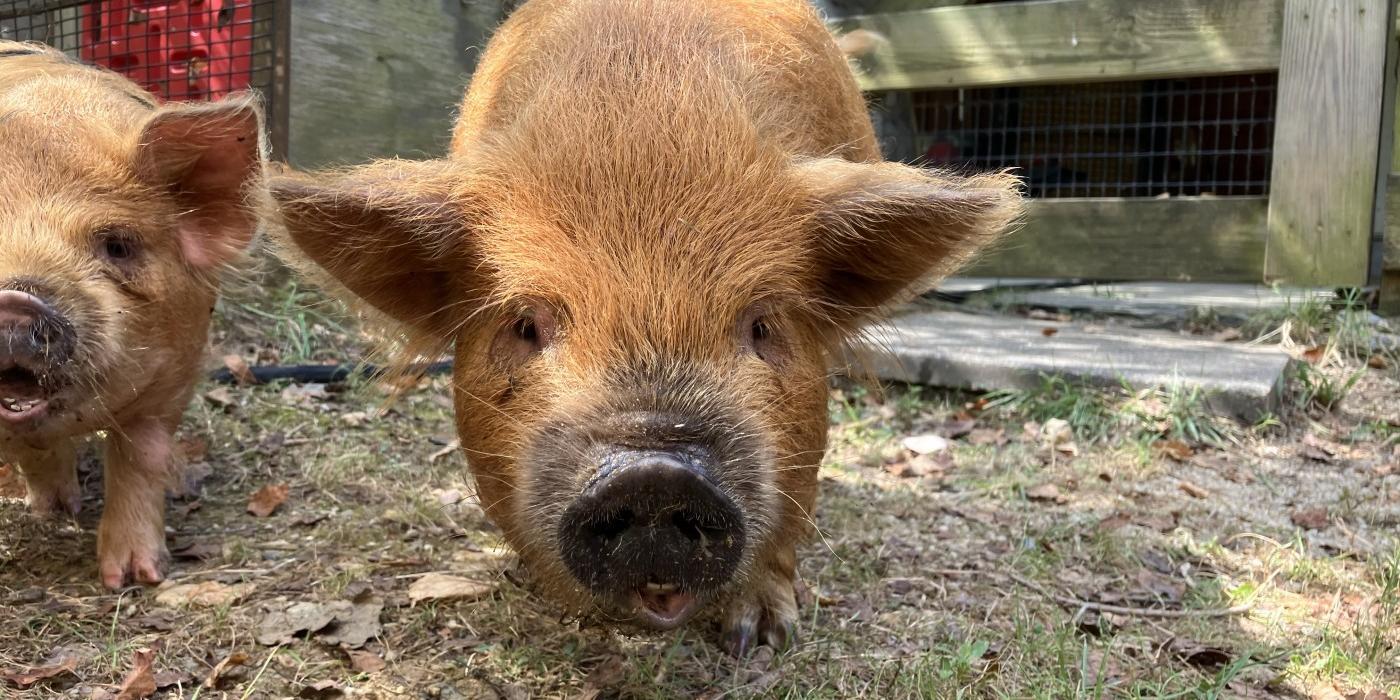Kunekune (pronounced KOO-nee KOO-nee) pigs are a small, hairy breed of domestic pig (Sus scrofa domesticus). Kunekunes are closely associated with the Māori, a diverse group of indigenous peoples from mainland New Zealand. In the Māori language, kunekune means “fat and round”.
Physical Description
Kunekune pigs are a relatively small breed of domestic pig. These pigs can come in various colors, such as cream, ginger, black, brown, and white, and their hair textures range from smooth to coarse and curly. Their coats can be spotted or solid in color. Additionally, their hair gets warmer or thicker depending on the season, and they often shed hair in warmer months. Many kunekune pigs have small, fleshy wattles on either side of their faces called "piri piri" that hang from either side of their faces. They also have curly tails and semi-lopped ears.
Size
Compared to many breeds of domestic pig, kunekunes are a little on the smaller side. Adults can reach up to 4 feet (1.2 meters) long and about 24 inches (60 centimeters) tall. Adult female kunekune pigs (referred to as "sows") typically weigh between 120-200 pounds (54-90 kilograms), while adult males (referred to as "boars") can grow up to 200-300 pounds (90-136 kilograms).
Native Habitat
As the domestic cousins of wild boars, pigs can thrive in a variety of habitats. The exact point of origin of the kunekune breed is unknown; however, the pigs similar traits with other breeds of domestic pigs found in Asia, South America, and the Polynesian Islands. It is believed that some percentage of the ancestors of modern kunekune pigs were brought to New Zealand in the 19th century by whalers and were later traded with the Māori people.
Lifespan
Kunekune pigs usually live about 15-20 years.
Communication
Kunekune pigs have many ways to communicate with other pigs, including vocalization, body language and scent markings. A low-pitched, contented grunting noise often means the pigs are relaxed. They also make this noise when they meet each other. High-pitched vocalizations mean the pigs are expressing stress or anxiety. These pigs also wag their tails and wiggle their ears to signal their emotions.
Food/Eating Habits
Domestic pigs are naturally omnivores, but most kunekune pigs raised on captivity are herbivores. Kunekunes are capable of eating a wide variety of vegetation, including eat grass, hay, grains, romaine lettuce and vegetables like tomatoes. Unlike other pigs, kunekunes do not specifically eat by foraging and can live exclusively on well-maintained pasture grass. Their short snouts make them great at grazing.
Sleep Habits
Domestic pigs tend to be active during the day and sleep at night.
Social Structure
Kunekune pigs are a domesticated species and are very social animals. In addition to forming complex social relationships with other pigs, kunekunes are accustomed to human companionship and are usually quite friendly toward humans. These pigs are known for being intelligent, playful and affectionate.
Reproduction and Development
Kunekune pigs breed throughout the year. Females reach sexual maturity at around 10 months old and males at around a year. Females have a gestation period of about 116 days, after which they give birth to litters of 6-12 piglets. Kunekunes take longer to grow into their adult size than other breeds of domestic pig.
Conservation Efforts
Domestic pigs had been maintained by the Māori people in New Zealand for centuries; however, crossbreeding with other domesticated pigs had nearly caused the kunekunes to be bred out of existence by the mid-20th century. In 1970, a tiny population of kunekune pigs was 'rediscovered' living among the Māori; only about 50 purebred kunekune pigs remained. Conservationists dedicated to restoring this breed spearheaded efforts to increase the kunekune population, and some of the pigs were exported to the United Kingdom to increase and diversify human-kept herds.
By 1990, conservationists' efforts had begun to pay off, and kunekune pigs arrived in the United States. All kunekunes in the U.S. are directly descended from New Zealand or U.K. stocks. Kunekune pigs are fully domesticated and can only be found in captivity.
Help this Species
Consider going meat-free one day each week to help reduce the demand on the livestock industry and decrease your carbon footprint!
Share the story of this animal with others. Simply raising awareness about this species can contribute to its overall protection.
Are you a student? Did you love what you learned about this animal? Make it the topic of your next school project, or start a conservation club at your school. You'll learn even more and share the importance of saving species with classmates and teachers, too.
Try fundraising for conservation organizations in new and fun ways. You could donate your birthday to conservation, or host a bakesale to benefit wildlife!
Growing, transporting and preparing food uses a lot of resources, so choose local, seasonal produce when possible. A significant amount of food waste also ends up in landfills, so only buy what you can eat.
Less is more. Cut down on the demand for resources by consuming less. Buy only what you need, and look for pre-owned or repurposed items before purchasing something brand new.
Smithsonian's National Zoo and Conservation Biology Institute. (n.d.). Kunekune pig. Retrieved January 27, 2026, from https://nationalzoo.si.edu/animals/kunekune-pig
Animal News



